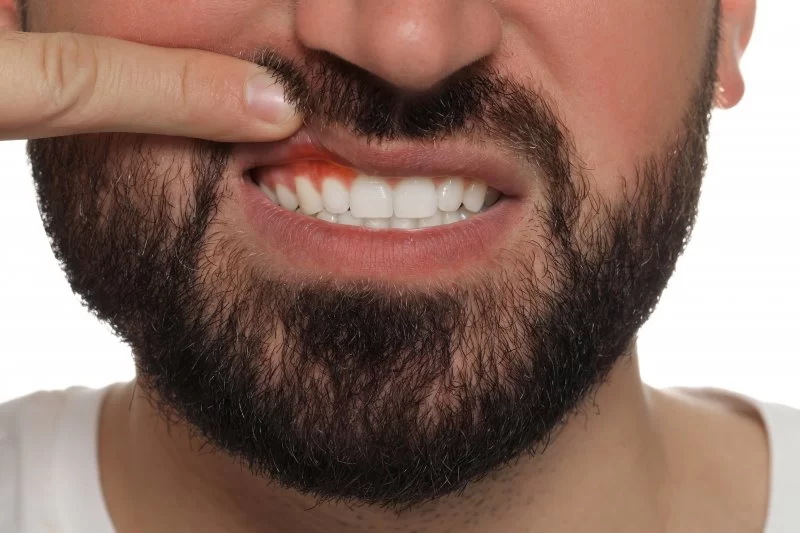
Understanding the Link Between High Blood Pressure and Oral Health
High blood pressure, also known as hypertension, is a common health condition that affects millions of people worldwide. While many people are aware of its impact on the heart and overall health, fewer are aware of how it can affect their oral health. In this article, we will explore the various ways in which high blood pressure can influence your teeth, gums, and overall oral hygiene.
The Impact of Hypertension on Gum Health
One of the most significant effects of high blood pressure on oral health is its impact on the gums. Hypertension can reduce blood flow to the gums, which weakens the gum tissue and makes it more susceptible to infection. This reduced circulation also leads to slower healing after any dental procedures or injuries.
Studies have shown that people with high blood pressure are at a higher risk of developing gum disease, also known as periodontal disease. Periodontal disease occurs when the gums become infected and inflamed, often leading to swollen gums, bad breath, and, in severe cases, tooth loss. The bacteria that cause gum disease can enter the bloodstream and potentially affect other organs, which is why controlling high blood pressure is crucial to preventing further health complications.
How Hypertension Affects Your Teeth
Hypertension can also affect the teeth in more subtle ways. High blood pressure may make individuals more prone to tooth decay and dental cavities. This is because hypertension medications, such as diuretics or beta-blockers, can cause dry mouth, a condition that reduces the amount of saliva in the mouth. Saliva is essential for neutralizing acids and washing away food particles and bacteria, which helps protect your teeth from cavities and decay.
A dry mouth caused by hypertension can lead to an increased risk of cavities, gum disease, and even mouth infections. Furthermore, certain medications used to treat hypertension may also contribute to plaque buildup, which can lead to the formation of tartar and cause tooth sensitivity and discomfort.
Managing Oral Health with High Blood Pressure
If you have high blood pressure, it's essential to take extra care of your oral health. Regular dental checkups are more important than ever, as they allow your dentist to spot any early signs of gum disease or other oral health problems. Brushing your teeth at least twice a day and flossing daily can help prevent plaque buildup, and using a mouthwash that fights bacteria can also improve your oral hygiene.
For those on medication for hypertension, drinking plenty of water and using saliva-stimulating products, like sugar-free gum, can help alleviate dry mouth. It's also important to stay hydrated throughout the day to ensure your mouth stays moist and healthy.
Maintaining a healthy diet rich in vitamins and minerals can also support your oral health. For example, foods high in calcium, such as dairy products, and vitamin C, found in citrus fruits, can help keep your gums strong and resilient. Avoiding sugary foods and drinks is also key, as they can contribute to the development of cavities and gum disease.
Stories from Real Patients: The Importance of Oral Care in Hypertension
John, a 58-year-old man diagnosed with high blood pressure several years ago, began noticing issues with his gums after starting his medication. His gums became swollen and bled frequently when he brushed his teeth. At first, he thought it was just a minor issue, but after a few weeks, the symptoms worsened. John visited his dentist, who explained the connection between his blood pressure medication and his gum health. By following a proper oral care routine, including more frequent dental cleanings and the use of fluoride toothpaste, John was able to control the situation and keep his gums healthy. His story highlights the importance of regular dental visits and taking proactive measures to protect oral health when managing high blood pressure.
What You Can Do: Tips for Healthy Teeth and Gums with High Blood Pressure
If you have high blood pressure, follow these simple tips to keep your oral health in check:
- Brush your teeth at least twice a day using fluoride toothpaste.
- Floss daily to remove food particles and plaque between your teeth.
- Stay hydrated to combat dry mouth and promote saliva production.
- Visit your dentist regularly for checkups and cleanings.
- Use alcohol-free mouthwash to fight bacteria and freshen your breath.
- Eat a balanced diet that supports healthy gums and teeth.
- Consider using a saliva substitute if dry mouth becomes a persistent issue.
By following these guidelines and working closely with your healthcare providers, you can minimize the impact of high blood pressure on your oral health and maintain a bright, healthy smile for years to come.
The Role of Regular Dental Care in Managing Hypertension
Regular dental care not only helps maintain a healthy smile, but it also plays a crucial role in managing the complications of hypertension. A dentist can monitor changes in your oral health and alert you to any potential issues that might be linked to your blood pressure. Early detection and treatment of oral health problems can prevent more serious conditions down the line, ensuring that your teeth and gums remain healthy as you manage your hypertension.
In conclusion, while high blood pressure is a serious condition that requires careful management, it’s important not to overlook the impact it can have on your oral health. By staying proactive and diligent in your oral hygiene routine, you can help protect your teeth and gums and reduce the risks associated with hypertension.







 Dr. Christian E. Miller, DDS5.0 (5 review)
Dr. Christian E. Miller, DDS5.0 (5 review) Elevation Dental: Dr. Troy Flowers DDS4.0 (15 review)
Elevation Dental: Dr. Troy Flowers DDS4.0 (15 review) New England Endodontic Solutions4.0 (111 review)
New England Endodontic Solutions4.0 (111 review) Smile Construction Orthodontics5.0 (27 review)
Smile Construction Orthodontics5.0 (27 review) Greencastle Dental4.0 (653 review)
Greencastle Dental4.0 (653 review) Steven J. Moravec, DDS, MS4.0 (189 review)
Steven J. Moravec, DDS, MS4.0 (189 review) The Importance of Oral Health Education During Pregnancy for a Healthy Pregnancy
The Importance of Oral Health Education During Pregnancy for a Healthy Pregnancy Best Tips for Brushing Your Teeth Properly for Healthy Gums: Essential Techniques for Oral Health
Best Tips for Brushing Your Teeth Properly for Healthy Gums: Essential Techniques for Oral Health Why Skipping Dental Checkups Can Lead to Bigger Oral Health Problems
Why Skipping Dental Checkups Can Lead to Bigger Oral Health Problems Advantages of Porcelain Dental Restorations
Advantages of Porcelain Dental Restorations How Can Diabetes Cause Tooth and Gum Problems? Preventing and Managing Oral Health Issues
How Can Diabetes Cause Tooth and Gum Problems? Preventing and Managing Oral Health Issues Healthy Habits for Promoting Good Oral Health and Hygiene: Tips for a Healthy Smile
Healthy Habits for Promoting Good Oral Health and Hygiene: Tips for a Healthy Smile